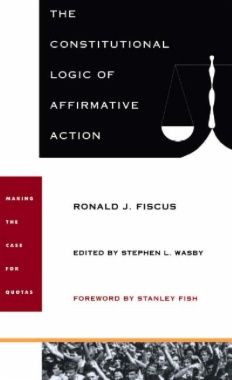Few issues are as mired in rhetoric and controversy as affirmative action. This is certainly no less true now as when Ronald J. Fiscus’s The Constitutional Logic of Affirmative Action was first published in 1992. The controversy has, perhaps, become more charged over the past few years. With this compelling and rigorously reasoned argument for a constitutional rationale of affirmative action, Fiscus clarifies the moral and legal ramifications of this complex subject and presents an important view in the context of the ongoing debate.
Beginning with a distinction drawn between principles of compensatory and distributive justice, Fiscus argues that the former, although often the basis for judgments made in individual discrimination cases, cannot sufficiently justify broad programs of affirmative action. Only a theory of distributive justice, one that assumes minorities have a right to what they would have gained proportionally in a nonracist society, can persuasively provide that justification. On this basis, the author argues in favor of proportional racial quotas—and challenges the charge of “reverse discrimination” raised in protest in the name of the “innocent victims” of affirmative action—as an action necessary to approach the goals of fairness and equality.
The Constitutional Logic of Affirmative Action focuses on Supreme Court affirmative action rulings from Bakke (1976) to Croson (1989) and includes an epilogue by editor Stephen L. Wasby that considers developments through 1995. General readers concerned with racial justice, affirmative action, and public policy, as well as legal specialists and constitutional scholars will find Fiscus’s argument passionate, balanced, and persuasive.
- Contents
- Foreword
- Editor’s Preface
- Author’s Preface
- Introduction
- 1. The Central Argument
- The Meaning of Racial Correlations Given Nonracist Assumptions and Original Positions
- Of Molecules and Mobility
- Required Assumptions and the Court
- Race and Cultural Ethnicity Distinguished
- 2. The Innocent Persons Argument Examined
- The Innocent Person Shown to Be Guilty When Claiming Proportional Set-Aside Positions
- The Innocent Persons Argument and the Court
- The Misplaced Emphasis on Innocence and Blame
- 3. Proportionate and Disproportionate Quotas: The Key Distinction
- Formalism
- Entitlement
- The Supreme Court and the Proportionality Principle
- Related Constitutional Arguments
- Scholarly Comment and the Proportionality Principle: Ronald Dworkin and the Rights of Whites
- 4. Applying the Principles: The Supreme Court and Affirmative Action
- In General
- Local versus National Standards
- Applicant versus Labor Pool
- The Complications of Seniority and Repeat Applications in Hiring and Promotions
- Seniority, Repeat Applications, and Layoffs: The Stotts Case Revisited
- Epilogue
- Notes
- Table of Cases
- Index

